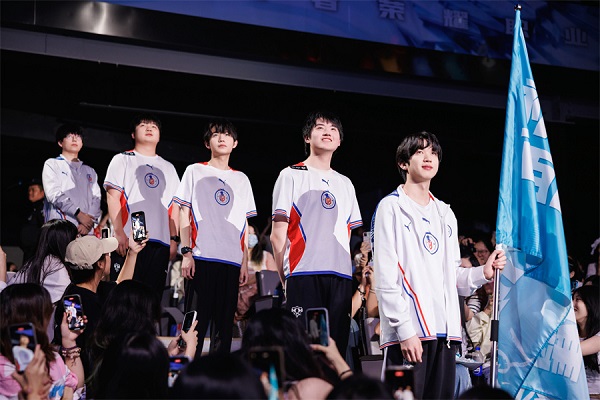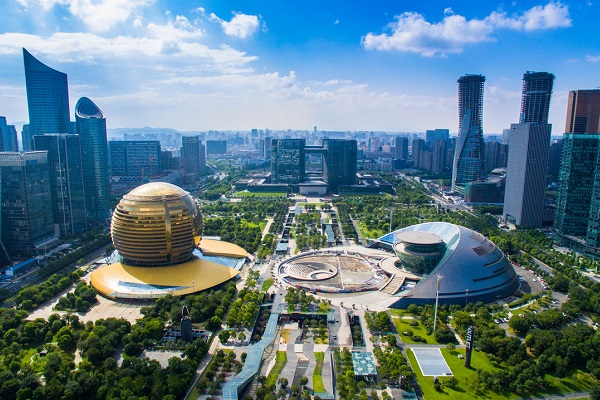Into the esports arena

Members of LGD Gaming club enter the arena of King Pro League Summer 2024 in Shanghai on Aug 29. [Photo/China Daily]
China's younger generation is setting the pace as Honor of Kings and other online battle games take the world by storm
The parents of 20-year-old Li Daheng did not support him when he first decided to become a professional esports player a few years ago. Their opposition didn't work.
"There are many choices," Li mused from an esports club in Chongqing. "Each choice is the best — or at least the one you are most willing to make at the moment."
Li became a member of China's King Pro League Dream Team, which in early August emerged victorious with a decisive 3-0 finals victory in the Honor of Kings Invitational Midseason at the Esports World Cup in Saudi Arabia.
"I needed to prove myself with good results. And in the end I succeeded," he said of his performance in Honor of Kings, a multiplayer mobile battle arena game that's played online. It was developed by TiMi Studio Group under Tencent Games.
Li uses the game ID "Pang".
Officially launched for public testing in November 2015, the game has attracted more than 200 million users across its domestic and international servers.
Li's parents now come to watch his matches. The excitement is hard to resist.
"I feel that my journey in the esports field will be a long one," Li said. "There are still many goals I have not achieved yet."
Before winning the Esports World Cup title, Li, also known by fans as the "strongest jungler", was named Most Valuable Player in the 2022 KPL Summer Finals and the 2024 KPL Spring Finals.
"In the future, I will continue to pursue better results, win more championships and strive for higher achievements," he said.
Like Li — and partly because of him — a growing number of young people across the country have developed an interest in esports. Some have entered the professional ranks, as esports has emerged as a global digital phenomenon.
Many Chinese cities have introduced supportive policies to cultivate and elevate esports into a thriving industry. Recognition of esports events has risen in recent years, as evidenced by the spectacular showcasing of esports as an official event at the Hangzhou Asian Games in 2023, where it drew around 370 million viewers via new media platforms.
According to the China Esports Industry Report for January to June this year, which was released in July in Shanghai, the number of esports users in China was approximately 490 million, a 0.52 percent year-on-year growth.
Youth is a key characteristic of the esports community, with individuals aged 30 and below accounting for 80.2 percent of participants, the report said.
During the same period, esports revenues in China reached above 12 billion yuan ($1.7 billion) for a growth rate of 4.43 percent year-on-year. That reversed the previous two-year trend of declining revenues, the report said.
The recognition has gone global: Before the 2024 Summer Olympics in Paris, the International Olympic Committee announced that the first Olympic Esports Games would be held in Saudi Arabia in 2025, indicating that gaming as an official Olympic sport had come of age.
China's booming development of esports in recent years is partly due to low entry barriers and aggressive training and competition systems for young people, according to Pan Fei, general manager of LGD Gaming, a major force in professional esports based in Hangzhou, Zhejiang province.
"In reality, anyone who has a phone or a computer can connect with games," Pan said. But achieving excellence is quite difficult.
"Fortunately, the esports user base in China is large, which means that we can select from a relatively broad pool of talent," Pan said.
The domestic esports tournament system consists of multiple tiers of competitions — from national championships all the way to fourth-tier and professional leagues.
China has developed professional leagues, such as League of Legends and Peace Elite — for popular games like Honor of Kings.
"This tiered professional system is well established in China and provides a stage for many young people to showcase their esports talents," Pan said, adding that the country also features many esports clubs, such as LGD, that place a strong emphasis on youth training.
LGD is a grassroots club without major financial backers or support, Pan said.
"Over the years of operation, we have always placed great importance on our youth training, aiming for sustainability," he said.
Any career has its professional life span or cycle, he said, so it's inevitable that a player's competitive performance will decline. "Therefore, from our perspective, maintaining a club's long-term development is crucially dependent on youth training, which can ensure a relatively long life span for a club."
Clubs like LGD that prioritize youth training and development, provide young players with opportunities to get a lot of playing time and experience — and most importantly, a stage on which to showcase their talent, he said.
"Therefore, I believe that these factors, including a large user base, a healthy training regimen and a strong competition system are crucial in enabling young players to rise prominently," he said.
Based on big data showing that the number of esports users is increasing around the world, Pan said he believed that the interests and hobbies of young people may be shifting more toward esports from traditional sports.
"By tapping into esports, I think we are capturing the preferences of young people," he said, because esports can provide them with a more enriching, quasi-amateur activity and better showcase their current interests and talent.
Singling out China's winning of several esports gold medals at the Hangzhou Asian Games last year, Pan noted that competitions across the country have helped nurture more young talent in the field.
LGD Gaming has the country's first professional esports arena, which the company developed in collaboration with the Gongshu district of Hangzhou as the home venue for the League of Legends project.
The 900-seat arena consistently sees more than 95 percent attendance, showcasing the enthusiasm of young people for esports, Pan said. The company has also collaborated with Hangzhou's Yuhang district to establish offline arenas for Honor of Kings.
To promote esports across the country, the LGD has also collaborated with counterparts in Guangzhou, Guangdong province, by establishing professional-grade facilities.
"These collaborations and the enthusiasm and engagement of audiences in esports competitions reflect the immense potential and appeal of this field," Pan said. "With the continuous growth of the esports industry, we can expect to see more similar collaborations and initiatives in the future."
Establishing esports arenas where fans can come for offline viewing is crucial for the development of esports, according to Xu Xinzhen, a 21-year-old player in the professional King Pro League for "Honor of Kings".
Xu, of LGD Gaming, developed an interest in esports when he realized he might be slightly better than other players.
"It was a coincidence, really. I decided to give it a try and also had a strong desire to aim for championships," Xu said.
The country's measures to provide a certain level of support have offered young people more choices. "Additionally, organizing more events like grassroots esports tournaments and collegiate leagues is very beneficial, since there are many young gamers, including college students, who might be interested," Xu said.
When entering the esports field, it's crucial not to rush things, because professional esports and casual gaming are different realms," he added.
"Success ultimately depends on one's own hard work and dedication to training. It's essential to focus on doing what needs to be done, be prepared to face outcomes and have the courage to start anew when necessary."
In the future, Xu's goal is to improve his personal gaming skills and competitive performance. "Winning championships should be the ultimate objective for anyone pursuing a career in professional esports," he said.
But he cautioned that while embracing esports is encouraged, it's important for individuals to have a comprehensive understanding of professional esports before making a choice.
"Every industry demands effort, but in esports, success begins with excellence in every practice match and dedicating a lot of time to training," he said. "That is the first step toward success."
-
Visionary Pathway - Hangzhou Playbook
July 15, 2025



